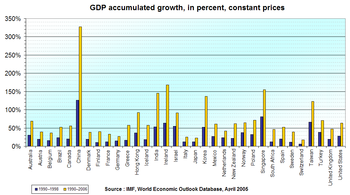
Gross domestic product growth in the advanced economies, accumulated for the periods 1990 – 1999 and 1990 – 2006. (Photo credit: Wikipedia)
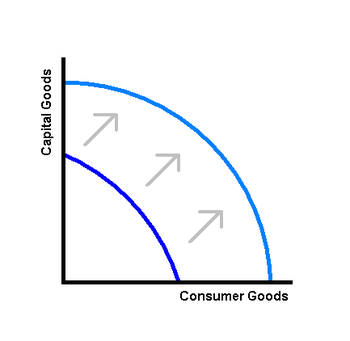
Economic Growth and the Production Possibility Curve (Photo credit: Wikipedia)

Counterfeit drugs (Photo credit: Wikipedia)

counterfeit cosmetics (Photo credit: Wikipedia)

Counterfeit jerseys (Photo credit: Wikipedia)
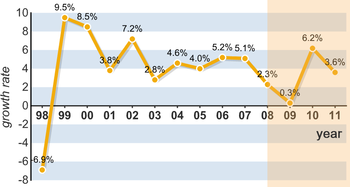
English: Korea Economic Growth Rate from 1997~2007 한국어: 10년간 한국 경제성장률 (Photo credit: Wikipedia)
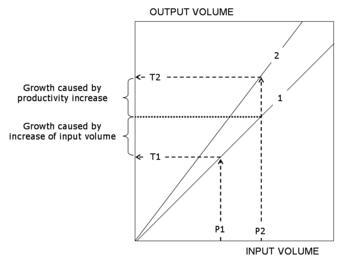
Components of economic growth (Saari 2006) (Photo credit: Wikipedia)
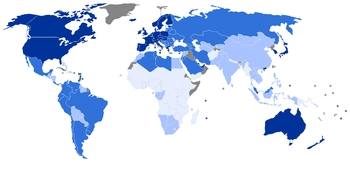
English: The United Nations Human Development Index (HDI) rankings for 2010. For full details, see List of countries by Human Development Index (en.wikipedia) Very High High Medium Low Data unavailable (Photo credit: Wikipedia)
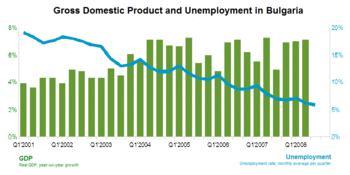
Quarterly Gross Domestic Product (year-on-year growth in real GDP) and Unemployment Rate (simple monthly average) (Photo credit: Wikipedia)
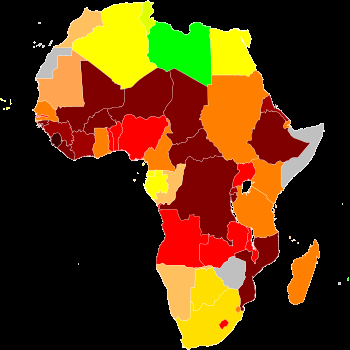
English: Map of Africa indicating Human Development Index. (Photo credit: Wikipedia)
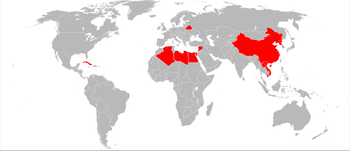
Socialism under different versions has lead people to lack of freedoms in vote (democracy) & economics (free market economy). This had brought persecution to the people & poverty.These are some of the fruits of Socialism: Communism(real Socialism) & Arab Socialism. (Photo credit: Wikipedia)
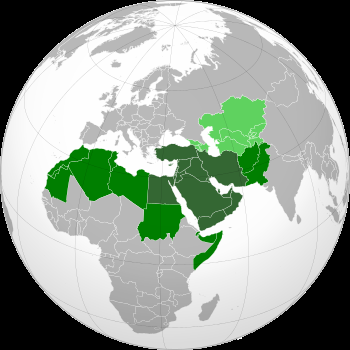
Greater Middle East (Photo credit: Wikipedia)

English: Regions of Chile by Human Development Index (Photo credit: Wikipedia)
“The overall attractiveness of a country as a market and/or investment site, depends on balancing the likely long-term benefits of doing business in that country against the likely costs and risks.”
Have you ever purchased a counterfeit product – perhaps a Gucci or Prada purse or a wallet or maybe even a watch?
This chapter addresses the implications of these purchase decisions on the real company as well as for the entrepreneur selling the counterfeit product.
Why is there a market for counterfeit goods?
How does this market benefit sellers?
What does it mean for the company producing the real product?
Where was the counterfeit product likely to have been made?
How do counterfeit products help an economy? How do they hurt it?
Differences in economic development across countries are often linked to differences in their political, economic, and legal systems.
Economic development can be measured by gross national income per head of population (GNI) (rather than GNP) and purchasing power parity (PPP) which is GNI per capita adjusted for cost of living.
The United Nations has developed the Human Development Index (HDI) to measure the quality of human life in different nations.
A country’s economic development is a function of its economic and political systems.
Economic freedom associated with a market economy creates greater incentives for innovation and entrepreneurship than either a planned or a mixed economy.
Innovation and entrepreneurship require strong property rights. Without strong property rights protection, businesses and individuals run the risk that the profits from their innovative efforts will be expropriated, either by criminal elements or by the state.
“People in the West tend to associate a representative democracy with a market economic system, strong property rights protection, and economic progress.”
Some totalitarian regimes have fostered a market economy and strong property rights protection and have experienced rapid economic growth including: four of the fastest-growing economies of the past 30 years—South Korea, Taiwan, Singapore, and Hong Kong.
In addition to political and economic systems, geography and education are also important determinants of economic development
Lately, many totalitarian governments have collapsed and are being replaced by democratically elected governments that were typically more committed to free market capitalism than their predecessors had been. These changes were most dramatic in Eastern Europe, where the collapse of communism bought an end to the Cold War and led to the breakup of the Soviet Union. Similar changes are occurring throughout the world. Asia, Latin America, the Middle East and Africa there are shifting toward greater democracy.
To explore the recent changes in the Middle East, consider {http://www.businessweek.com/news/2011-07-07/the-perils-of-economic-populism-in-the-mideast-steffen-hertog.html} and also iGLOBE What Political Models Might Shape The New Libya, Tunisia?
The reasons for the spread of democracy include:
1. Many totalitarian regimes failed to deliver economic progress to the bulk of the populations.
2. New information and communication technologies, including social media have broken down the ability of the state to control access to uncensored information.
3. The economic advances have led to the emergence of increasingly prosperous middle class; they have pushed for democratic reforms. The U.S. State Department produces a number of reports that are helpful to understanding the conditions in other markets, as well as information regarding visas and other relevant issues. The site is {http://www.state.gov/}.
Many economies around the world are in a state of Economic Transformation that involves:
1. Deregulation removes legal restrictions to the free play of markets, and allows the establishment and operations of private enterprises.
2. Privatization transfers ownership of state property into the hands of private individuals, frequently by the sale of state assets through an auction.
Markets that were formerly off-limits to Western business are now open for business. China with its 1.2 billion people and India with its population of 1.1 billion present especially attractive opportunities for growth.
The political, economic, and legal systems of a country can raise important ethical issues that have implications for the practice of international business. The long-run benefits of doing business in a country are a function of the size of the market and the present and projected future wealth of consumers in that market.
There are three types of costs involved in international business: political costs, economic costs, and legal costs. There are three types of risk involved in international business: political risk, economic risk, and legal risk.

